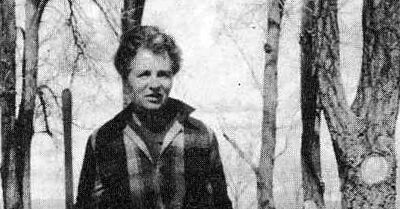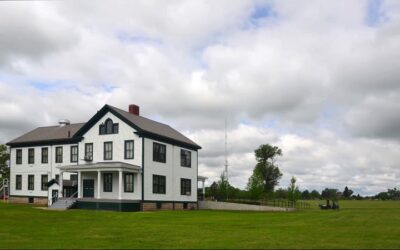William C. Holden (1842-1901), remembered as one of Nebraska’s most aggressive and colorful newspapermen, was associated with papers in Harlan County and in Kearney and Lincoln. His purchase of the Central Nebraska Press at Kearney in 1879 introduced an era of muckraking there that lasted for nearly ten years. Historian Samuel Clay Bassett in the first volume of his history of Buffalo County, published in 1916, wrote that Holden “seemed to take delight in general attacks on individuals and it would have occasioned little surprise had he been killed by some whom he attacked.”
Holden, a native of Indiana, learned the printer’s trade as a boy. In 1861 he enlisted as a private in Company K, Second Iowa Cavalry, in which he served until the close of the Civil War. After his discharge at Davenport, Iowa, in August 1865, he was associated with newspapers at Ottumwa and Red Oak. He moved to Nebraska in 1873, settling near Orleans, where he and Webster Eaton started the Republican Valley Sentinel, the first paper published in Harlan County. A year later Holden sold it and moved to Melrose, about two miles away, and established the Republican Valley Tribune there. He soon consolidated it with the Melrose Advertiser and continued the paper until the fall of 1875.
After working as a railway mail clerk for several years, Holden bought the Central Nebraska Press at Kearney in March of 1879. Only one copy of the papers published during Holden’s tenure survives, that of March 19, 1881. In a vitriolic story titled “Wonderful Heroism,” Holden chronicled the woes of a David and Mrs. Allen, indicted for perjury, who had fled to Denver, where they were jailed before being returned to “the hog pen known as the Buffalo County Jail.” Historian Bassett noted that the Press under Holden was “the personal organ of its editor, used too often to ‘get even,’ as it might be termed, rather than in the dissemination of news and the upbuilding of the community. . . . It is true, that in some cases, the provocation was great and the parties guilty as publicly charged, but the Press under Mr. Holden’s management lost public favor, public influence and public support.”
The Central Nebraska Press was discontinued about 1887. In 1888 Holden established the Liberty Bell, continuing the muckraking tone for which he was notorious. He also took over the Courier, established in 1888 by Ferdinand McConnel. Holden moved to Lincoln about 1890, where he published the newspaper Liberty. From Nebraska he moved to Galesburg, Illinois, and ran for Congress in 1894. By 1898 he was again in the publishing business at Kansas City. He died June 21, 1901, at Hutchinson, Kansas, at the home of a daughter.
At the funeral, held in Kearney under auspices of the GAR, the memorial discourse characterized Holden as “an aggressive, forceful character, a kind husband, a loving father [of twelve children], and a magnanimous man. He was ferocious as a fighter but gentle in his forgiveness and most tender in his friendships. We shall know few like him. His best success is a family of manly sons and womanly daughters who have inherited strong characters and are carving out honorable places in the affairs of the world.” (Kearney Daily Hub, June 26, 1901)

Solomon D. Butcher’s photo of the Kearney New Era printing office about 1904. The New Era was formed in 1895 from the Nebraska Standard and the People’s Sentinel (which had earlier absorbed Holden’s Courier). NSHS RG2608-2625



